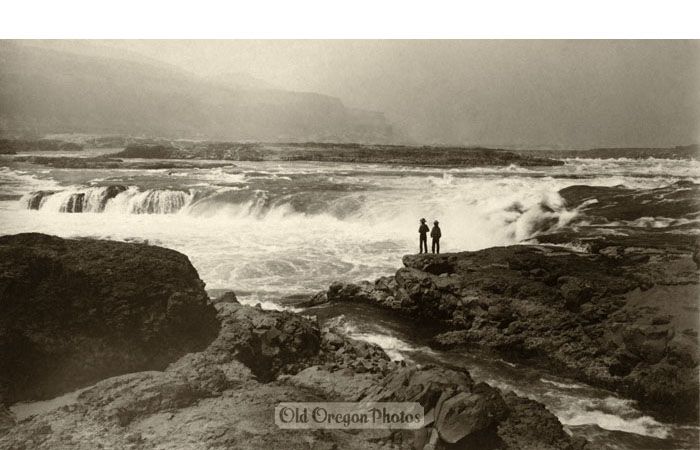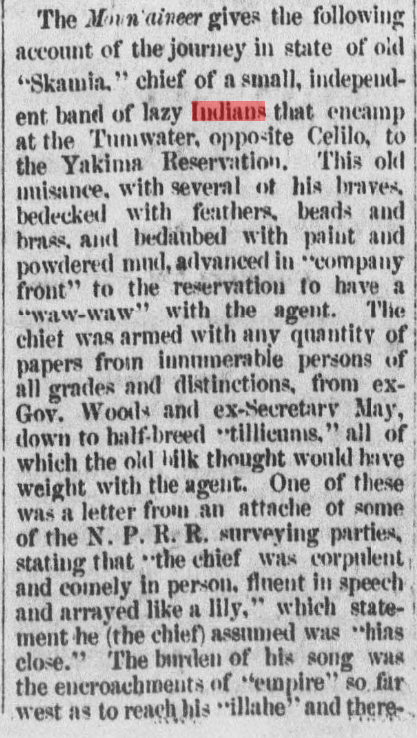1873, OR/WA Territory: Old Skamia of the Tumwater threatens war for Native rights
The Chinuk Wawa here looks fairly real, so this may be proof that Jargon speakers said “south”.
This frontier-era local news item is predictably racist towards Indigenous people, but it’s valuable and useful information too.

Tumwater (Celilo) Falls, Columbia River, circa 1885 (image credit: Old Oregon Photos)
Besides the Jargon data here, we have a mention of skookum papers, albeit in the all-too-frequent absence of that phrase being explicitly used. Skookum papers were letters from Settler/colonizers describing the character of the Native holder, usually a male traditional leader.
We also have here an acknowledgment that Indigenous people were struggling to preserve their rights against Settler encroachment. Here, an “independent band” means any tribe who stayed apart from the treaty-making process.
“Skamia” was Sx̣imáya of Sk’ín, an influential Sahaptin prophet of the pro-Native, anti-acculturation Dreamer religion.
The Modoc people of southwest Oregon and northwest California were involved in war against the US government at the time of this article.


The Mountaineer gives the following
account of the journey in state of old
“Skamia.” chief of a small, independ-
ent band of lazy Indians that encamp
at the Tumwater, opposite Celilo, to
the Yakima Reservation. This old
nuisance, with several of his braves,
bedecked with feathers, beads and
brass, and bedaubed with paint and
powdered mud, advanced in “company
front” to the reservation to have a
“waw-waw” with the agent. The
chief was armed with any quantity of
papers from innumerable persons of
all grades and distinctions, from ex-
Gov. Woods and ex-Secretary May,
down to half-breed “tillicums,” all of
which the old bilk thought would have
weight with the agent. One of these
was a letter from an attache of some
of the N. P. R. R. surveying parties.
stating that “the chief was corpulent
and comely in person. fluent in speech
and arrayed like a lily,” which state-
ment he (the chief) assumed was “hias
close.” The burden of his song was
the encroachments of “empire” so far
west as to reach his “illahe” and there-
fore must be wheeled about and faced
to the west. Whether the agent suc-
ceeded in convincing him that the star
was in the ascending node westward
and could not be turned back for his
special accommodation, we are not in-
formed. He was particular to state
that the “south tillicums,” meaning
the Modocs, had solicited their assis-
tance and recognizance as belligerents,
and if they were ever forced to go on
the reservation it would be over the
slain of his band.”
— from the Albany (OR) Register of February 14, 1873, page 3, columns 3-4
- waw-waw = wáwa = ‘a talk, a conference’
- tillicums = tílixam-s = ‘friends; people’
- hias close = hayas-łúsh = ‘very good’
- illahe = ílihi = ‘land; home place’
- south tillicums = sáwth* tílixam-s = ‘southern (Indigenous) people’
